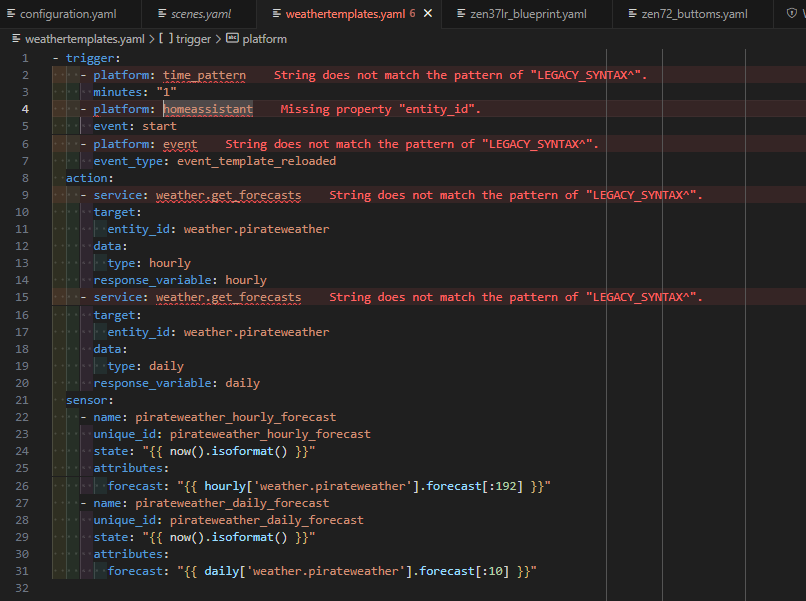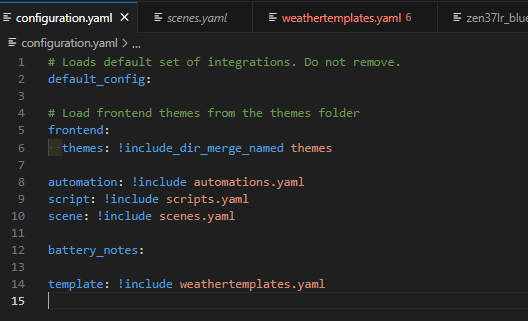after tons of experimentation with different weather integrations and custom lovelace cards… I’ve finally settled on a near copycat of what i consider to be a terrific 10 day outlook, wunderground’s graph.
For a good long while, I was relying on capture-website , narrowed down to the specific DIV, and filtering out a couple headers to tighten it up… screenshot below for comparison, worked ok, but didn’t have dark mode, wasn’t interactive, and was fairly dense given the small screen realestate i afforded it on my dashboards. I set the screen capture on an hourly cron and exposed the PNG via a live camera card so it was constantly refreshed.
Also – lived in fear that the weather channel would eventually kill or significantly change the code on this page… so it was on a short list to figure out how to replicate this using raw data in HA. And I’ve done so with apexcharts and pirateweather (although you should be able to use most any weather entity with a forecast… nothing unique about my pirateweather impl):
now – i did have to first split out the forecast dict from the weather entity, a well discussed and published workaround for accessing forecast attributes:
- trigger:
- platform: time_pattern
minutes: 15
- platform: homeassistant
event: start
- platform: event
event_type: event_template_reloaded
action:
- service: weather.get_forecasts
target:
entity_id: weather.pirateweather
data:
type: hourly
response_variable: hourly
- service: weather.get_forecasts
target:
entity_id: weather.pirateweather
data:
type: daily
response_variable: daily
sensor:
- name: pirateweather_hourly_forecast
unique_id: pirateweather_hourly_forecast
state: "{{ now().isoformat() }}"
attributes:
forecast: "{{ hourly['weather.pirateweather'].forecast[:192] }}"
- name: pirateweather_daily_forecast
unique_id: pirateweather_daily_forecast
state: "{{ now().isoformat() }}"
attributes:
forecast: "{{ daily['weather.pirateweather'].forecast[:10] }}"
and my apex code, for anyone else that likes this approach…
type: custom:apexcharts-card
card_mod:
style: |
ha-card {
border: solid 0px;
background: none;
}
graph_span: 7d
span:
start: hour
update_interval: 1h
# layout: minimal
apex_config:
# chart:
# height: 250px
dataLabels:
enabled: true
legend:
position: 'top'
horizontalAlign: 'right'
floating: true
# fontSize: '14px'
# show: false
xaxis:
labels:
format: 'ddd'
grid:
show: false
annotations:
xaxis:
# - x: '${new Date(states["sun.sun"].attributes.next_rising).getTime() }'
# - x: EVAL:new Date( {{as_timestamp(states["sun.sun"].attributes.next_setting)}} )
- x: EVAL:new Date().setHours(20,0,0)
x2: EVAL:new Date().setHours(20,0,0) + 10*60*60*1000
borderColor: none
fillColor: dimgray
opacity: 0.2
label:
text: ☾
borderWidth: 0
offsetX: 8
style:
color: gold
background: '#0000'
- x: EVAL:new Date().setHours(20,0,0) + 10*60*60*1000
borderColor: none
label:
text: ☼
borderWidth: 0
offsetX: 8
style:
color: gold
background: '#0000'
- x: EVAL:new Date().setHours(20,0,0) + 24*60*60*1000 *1
x2: EVAL:new Date().setHours(20,0,0) + 10*60*60*1000 + 24*60*60*1000 *1
borderColor: none
fillColor: dimgray
opacity: 0.2
label:
text: ☾
borderWidth: 0
offsetX: 8
style:
color: gold
background: '#0000'
- x: EVAL:new Date().setHours(20,0,0) + 10*60*60*1000 + 24*60*60*1000 *1
borderColor: none
label:
text: ☼
borderWidth: 0
offsetX: 8
style:
color: gold
background: '#0000'
- x: EVAL:new Date().setHours(20,0,0) + 24*60*60*1000 *2
x2: EVAL:new Date().setHours(20,0,0) + 10*60*60*1000 + 24*60*60*1000 *2
borderColor: none
fillColor: dimgray
opacity: 0.2
label:
text: ☾
borderWidth: 0
offsetX: 8
style:
color: gold
background: '#0000'
- x: EVAL:new Date().setHours(20,0,0) + 10*60*60*1000 + 24*60*60*1000 *2
borderColor: none
label:
text: ☼
borderWidth: 0
offsetX: 8
style:
color: gold
background: '#0000'
- x: EVAL:new Date().setHours(20,0,0) + 24*60*60*1000 *3
x2: EVAL:new Date().setHours(20,0,0) + 10*60*60*1000 + 24*60*60*1000 *3
borderColor: none
fillColor: dimgray
opacity: 0.2
label:
text: ☾
borderWidth: 0
offsetX: 8
style:
color: gold
background: '#0000'
- x: EVAL:new Date().setHours(20,0,0) + 10*60*60*1000 + 24*60*60*1000 *3
borderColor: none
label:
text: ☼
borderWidth: 0
offsetX: 8
style:
color: gold
background: '#0000'
- x: EVAL:new Date().setHours(20,0,0) + 24*60*60*1000 *4
x2: EVAL:new Date().setHours(20,0,0) + 10*60*60*1000 + 24*60*60*1000 *4
borderColor: none
fillColor: dimgray
opacity: 0.2
label:
text: ☾
borderWidth: 0
offsetX: 8
style:
color: gold
background: '#0000'
- x: EVAL:new Date().setHours(20,0,0) + 10*60*60*1000 + 24*60*60*1000 *4
borderColor: none
label:
text: ☼
borderWidth: 0
offsetX: 8
style:
color: gold
background: '#0000'
- x: EVAL:new Date().setHours(20,0,0) + 24*60*60*1000 *5
x2: EVAL:new Date().setHours(20,0,0) + 10*60*60*1000 + 24*60*60*1000 *5
borderColor: none
fillColor: dimgray
opacity: 0.2
label:
text: ☾
borderWidth: 0
offsetX: 8
style:
color: gold
background: '#0000'
- x: EVAL:new Date().setHours(20,0,0) + 10*60*60*1000 + 24*60*60*1000 *5
borderColor: none
label:
text: ☼
borderWidth: 0
offsetX: 8
style:
color: gold
background: '#0000'
- x: EVAL:new Date().setHours(20,0,0) + 24*60*60*1000 *6
x2: EVAL:new Date().setHours(20,0,0) + 10*60*60*1000 + 24*60*60*1000 *6
borderColor: none
fillColor: dimgray
opacity: 0.2
label:
text: ☾
borderWidth: 0
offsetX: 8
style:
color: gold
background: '#0000'
- x: EVAL:new Date().setHours(20,0,0) + 10*60*60*1000 + 24*60*60*1000 *6
borderColor: none
label:
text: ☼
borderWidth: 0
offsetX: 8
style:
color: gold
background: '#0000'
yaxis:
- y: 10
- y: 32
- y: 80
# now:
# show: true
# color: red
yaxis:
- id: left
decimals: 0
min: ~0
max: ~80
apex_config:
tickAmount: 4
forceNiceScale: true
axisTicks:
show: false
- id: right
opposite: true
show: false
min: 0
max: 100
all_series_config:
stroke_width: 2
# extend_to_end: false
show:
legend_value: false
series:
- entity: sensor.pirateweather_hourly_forecast
name: temperature
unit: °F
color: red
yaxis_id: left
data_generator: |
return entity.attributes.forecast.map((entry) => {
return [new Date(entry.datetime), entry.temperature];
});
- entity: sensor.pirateweather_hourly_forecast
name: feels like
unit: °F
color: purple
yaxis_id: left
data_generator: |
return entity.attributes.forecast.map((entry) => {
return [new Date(entry.datetime), entry.apparent_temperature];
});
- entity: sensor.pirateweather_hourly_forecast
name: wind
unit: mph
color: green
yaxis_id: left
data_generator: |
return entity.attributes.forecast.map((entry) => {
return [new Date(entry.datetime), entry.wind_speed];
});
- entity: sensor.pirateweather_hourly_forecast
name: cloud coverage
unit: '%'
type: area
color: grey
opacity: 0.5
stroke_width: 0
yaxis_id: right
data_generator: |
return entity.attributes.forecast.map((entry) => {
return [new Date(entry.datetime), entry.cloud_coverage];
});
- entity: sensor.pirateweather_hourly_forecast
name: precip
unit: '%'
type: area
color: dodgerblue
opacity: 0.6
stroke_width: 0
yaxis_id: right
data_generator: |
return entity.attributes.forecast.map((entry) => {
var x = [new Date(entry.datetime), entry.precipitation_probability];
return x == 0 ? null : x
});
few notes on this apex graph:
- it auto updates hourly, i havn’t noticed any refresh related issues after a week or so of use
- the x-axis annotations for sunset and sunrise are hard coded. I wanted to use the sun’s next_setting and next_rising for the current day, and then some simple 24 hour math increments for the upcoming days… but i couldn’t get the template to work properly, and i found that the annotations were not auto-updated hourly. Minor inconveniences, maybe someone wants to use this or enhance it
- i didn’t include dew point or pressure from the original inspiration, as i was trying to minimize too much on the screen, but that wouldn’t be hard to add if someone wanted
- this is only forecast data, so the graph always starts at NOW. I set the span window to update hourly too so the period from midnight to NOW wasn’t just a blank hole… ideally i guess it’d be nice to show actual historical data there… I have not attempted to include that data in the generated data… i imagine that wouldn’t be that hard though. Might even be fun to scroll back a day or two if you wanted.
- also have not gotten to the wind direction annotations, but no reason to think it couldn’t be added like this



